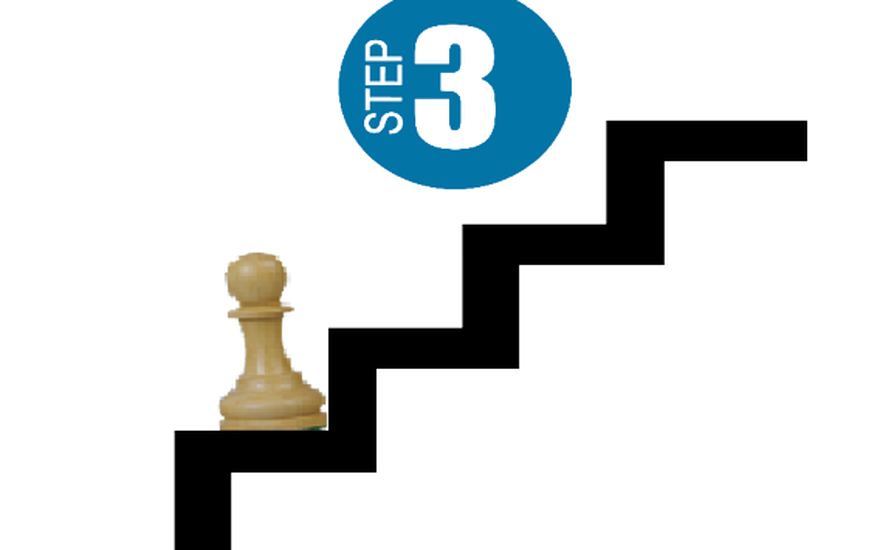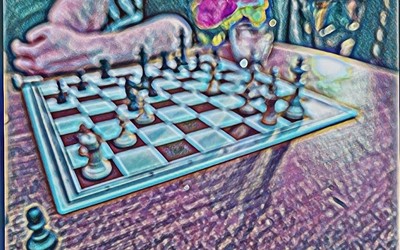
cleanpng.com
How to become... better | Step 3
The easiest step-by-step to get... anywhere (but at least better)Dealing with downers
Progress in Chess is not always recognizable.
Most of the time you may not even feel that great and like a genius, especially when beginners enter the game they expect to somehow become good by solving a few puzzles and playing random moves, they saw online. However, this is not how it works. At least not very well.
The first games were played, analyzed, and digested.
You may feel a bit dizzy, but here you are, making your way through this big world of chess. Right at the beginning. Well not really, because having read the first two chapters, you may have come up with some pretty good questions and answers, you may have gotten into some serious training, you may have learned some openings (which I want to address separately in an own blog post in the future of this series, no need to hurry!), or tactical patterns. And yes, that is a lot. But still very much in the beginning.
Because what you have to learn now, is not so much about the game itself, it is about the whole world around it. What this is about you may ask. Well, since chess is not only happening on the board itself but very much between the games too, it is a lesson that you will probably have to study over and over again, probably forever.
This is about losing.
Losing
Losing is hard, nobody likes to lose. As far as I know, everybody wants to win.
This may seem trivial, but stop, listen. It is not.
Understanding that losing is very much part of every game, even the ones you win is key.
And just because you won does not mean you weren't able to throw a game at some point. I have won enough games I should not have won to know this. As there is a proverb that goes "the one, who makes the mistake before the last mistake, wins" it is pretty clear, that you should not feel safe just because you just punished your opponent for his last mistake.
Indeed it is very important to understand that losing means nothing over time.
YES! it is a big bummer losing a rating, losing a match, losing is always sad. But over time it very much does not count at all.
Diving deeper, losing is the absence of a win. Why do we care? Because we are humans. Our brains are more or less designed to get that extra little kick of endorphins. We thrive to win because we simply do not like the absence of these little biological feel-good pills. And if we miss out on them for long enough, we may even toss it all. Understanding this function of our own is what can help us when things are gettin' serious.
In chess there are phases, when we really do not notice any progress, we seem to be stuck at some point, we lose our rating, we try harder and harder; just to get another ounce of dopamine.
This however may not be the best way to make progress, indeed it may turn out to be a big obstacle.
The solution: Learn to lose.
Embracing the absence of a win may seem contra intuitive. As we want to grow our skills we need to win! right?
Well, no. Not really. As I stated in the past, you are constantly learning. But whilst being corrupted by an unhealthy mindset, just on the way to the next easy win you may lose your focus.
Firstly it may lead to a very silly disbelieve in your own skills.
Secondly, you may catch yourself farming-off innocent weaker players, in order to get that fast win you need so desperately
And third and most important, it can either lead to a massive tilt, which makes it even worse or affect your brain in a way that makes it impossible to learn anything at all.
Since chess is a sport of the mind, it is very important to keep your mind clear.
When you are stuffed with emotions, especially the bad ones like sadness, frustration, anger, you simply turn off the little section that screens your behavior and concludes every little action you take.
You can visualize it as a little guy living rent-free in your head, writing down everything you do, checking whether the outcome was positive or negative, and then making suggestions in the future based on the written-down findings. This little guy, yeah you just send him home.
And without his clever clipboard, we all are lost.
Embracing to lose means deliberately welcoming a coming-in loss, longing for the following analysis, and deeply in joy for that little guy screening our terrible blunders to do better in the next game.
Stagnating
Multiple losses are no stagnation.
That being said, what then is stagnation?
Stagnation is the absence of instructive wins or losses over a longer period of time.
This can have multiple reasons.
1. Your analysis is done wrong/ without good enough effort
You may have noticed it: Chess is a lot of analysis. Well yeah, nobody can think of all the moves over and over again in every game. And likewise, analysis is the worthy try to look for patterns, that either lead to loss or victory. Everybody has to look for his own ones because although there are all the same pieces, everybody is moving them in a slightly different manner. So everybody has to learn on their own, what keeps them from being (even) better. Doing no analysis, doing it wrong, without the necessary effort - in the end, it is all the same: You don't get anywhere without understanding your very own style of losing. Once you get behind why you are doing this or that, you can work on it. Just repeating that chess is so hard, and omg I am too dumb to get this, won't get you anywhere. What does is reflection.
Get to know the problem, work on it, implement the solution, and become better. Simple enough right?
2. You concentrate on the wrong aspect
This can either mean you concentrate only (or too much) on your losses (which may turn out to be a far less big problem than actually having too many losses), or your work is not matching your weak spots.
For example; it would be complete nonsense, to just do mate-in-3-puzzles over and over again, when in reality this is already a strength of yours. Likewise, you should do openings, if you notice that it always happens at the early beginning of a match, that you encounter unforeseen hurdles and create the biggest blunders.
3. You don't take chess seriously
Well, if you don't take the sport seriously, why should the sport take you seriously?
And I really do not mean, to do anything else but chess from nine to five.
I mean you should not expect to become a grandmaster when you won't study as one.
Chess is a game, yes. But indeed it is so much more, than just randomly playing it won't bring you any closer to your goal of understanding it.
If you decided to learn a language, you are ought to speak it in order to finally perform your first sentence, essay, or even a diploma in such a language. It's the same with chess. And somehow it can be seen as a language too. If your opponent is approaching you with an opening and you do not understand it, you are very much likely to fail: Seeing the opening as a language, you are only able to play against it and win, by decoding it and answering in the matching words. 1. e4 - e5. To make it even more striking:
Playing 1. Nf3 - h4 is like being kindly asked whether you liked the pizza in that old restaurant in Venice and instead of answering "aveva un buon sapore" (it tasted very good) you just sit on top of the table and take a shit.
You see, once more it is up to you to encounter all that in a proper way.
Losing however is very much of daily business, learn to live with that truth.
Some story for the way
As this is already the third post of this series, and the interest in the wisdom I am spilling is tremendously high, I decided it would be a matching finisher for this one, to even spill some more.
So yeah, to start this off, there was this guy on the forum, who asked whether somebody else can share his experience, of being afraid to lose. In his example, it was about rating points. But I refer to this in a very broad sense. I helped him out by describing my history in a very detailed fashion, concluding, that loss should not be a reason to stop playing chess. Losing should be a reason to stop minding chess. To grant it such a high credit, when coming into our lives. I then closed it by stating, that rating is just a number, and one should really develop some sort of a "what-ever-policy" towards rating, especially since we chess guys are all incredibly driven by the conception that rating is our only purpose to live on; when there is rating there is hope. Seems to be pretty dramatic, right?
Well sadly enough that's who we all (at least very very most of us) were or will have been at some point.
When noticing this habit it's best to cut the cord. Because this is where losing really starts to become a problem. It is not the loss itself, it is the infliction, becoming a slave of a number. The number decides whether we are happy now, or not. But let me tell you this:
The rating is not the game. Your right to be happy does not depend on any number.
Let this be said by one of the formerly biggest rating-fetishist out here (I had tilts, so loud, up until today I would not be surprised if a neighbor asked me where I buried them corpses, he just heard their screams) and learn from my mistakes.
And with this little advice, I say thank you very much: Keep it up, or (better):
Lose it all!
Cheers!




